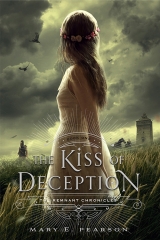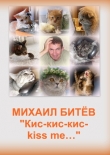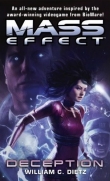
Текст книги "The Kiss of Deception"
Автор книги: Mary E. Pearson
Жанры:
Научная фантастика
,сообщить о нарушении
Текущая страница: 15 (всего у книги 20 страниц)
He found another dry niche far from the others and kicked away some rock to make a place to lay down. He dropped the bedrolls and his bag. There would be no dinner tonight. The weather made it impossible to gather or hunt. I took another swig of water to quell the rumble in my stomach. I could easily have eaten one of the horses.
With his back to me, Kaden unbuttoned his soaked shirt and pulled it off, hanging it from an outcropping of stone to dry. I stared at his back. Even in the dim firelight, I could see the marks across it. Multiple long scars that stretched from his shoulder blades to his lower back. He turned and saw me staring. I drew in a breath. His chest had more, long slashes that traveled crosswise down to his ribs.
“I guess you had to see sooner or later,” he said.
I swallowed. I remembered how he refused to take his shirt off at the games. Now I understood why.
“Some of your victims fought back?”
“On my back? Hardly. Don’t worry, these scars are old and long healed.” He laid out the bedrolls and motioned to the space beside him, waiting for me to lie down. I moved forward awkwardly and lay as close to the wall as possible.
I heard him stretch out next to me and felt his eyes on my back. I turned to face him. “If you didn’t get the scars from your work, how did you come by them?”
He was propped up on one elbow, and his other hand absently stroked the lines on his ribs. His eyes were unsettled as if he was recalling each lash, but his face remained calm, well practiced at burying his secrets. “It was a long time ago. It doesn’t matter anymore. Go to sleep, Lia.” He rolled to his back and closed his eyes. I stared at his chest and watched it rise in slow careful breaths.
It mattered.
Two hours later, I was still awake, thinking about Kaden and the violent life he led, more violent than I even knew. The scars frightened me. Not their appearance but where they had come from. He said they were old and long healed. How old could they be? He was only a couple of years older than I was. I wondered if Eben had scars beneath his shirt too. What did the Vendans do to their children? What would they do to me?
For the first time in what seemed an eternity, I was chilled. My clothes were soaked to the skin, but I had nothing else to put on. The hard ride from Civica to Terravin had been luxurious compared to this. The thunder continued to boom, but Kaden slept soundly, oblivious to the noise. He hadn’t shackled me at night since we left the Dark City, probably figuring my cut and bruised feet were enough to keep me from traveling far. That had been true—at first. They were mostly healed now, but I made sure I continued to limp generously enough to make him think otherwise.
The wind and rain still raged loud and furious, and the thunder vibrated through me. It was all so deafening it easily masked the roar of Griz’s snores. I rolled over and eyed the saddlebag lying at Kaden’s feet. My pulse sped. My knife was still in there. I would need it. The mad beating of rain could mask a lot more than snores.
My chest rose in faster breaths as I sat up slowly. With the forest around us, there were places to hide now, but could I ride an unsaddled skittish horse in a furious storm? Just trying to get up on its back without stirrups would be a challenge if I could manage it at all. But if I could lead one of them to a downed log …
I got to my feet, crouching at first, and then I stood, waiting to see if anyone noticed. They didn’t. I took a deep breath and walked to Kaden’s feet, then stooped, never taking my eyes from him as I carefully lifted his saddlebag. I was afraid to even swallow. The storm covered any sound I made, but I’d rummage through his bag for my knife once I was outside. I took a shaky cautious step—
Don’t go. Not yet.
I stopped. My throat pinched shut. My feet were ready to run, but a voice as clear as my own warned me not to. My fist shook, tightly clenching the bag.
Not yet.
I stared at Kaden, unable to move. Damn whatever spoke to me. I forced air into my lungs and slowly, against every other demand screaming in my head, crouched again, inch by inch, to set the saddlebag back at his feet. And then, just as slowly, I stepped back and lay down beside him. I stared up at the stones above us, my eyes wet with frustration.
“Wise move,” Kaden whispered, without ever opening his eyes.
CHAPTER FIFTY-ONE
RAFE
I was twelve when Sven began teaching me to track. I had complained bitterly, preferring to spend my time training with a sword or learning maneuvers on the back of a horse. I couldn’t be bothered with the quiet, careful work of a tracker. I was a soldier. Or I was going to be one.
He had shoved me, sending me sprawling to the ground. The enemy doesn’t always march in great armies, boy, he said with contempt. Sometimes the enemy is just one person who will bring down a kingdom. He had glared down his long, sharp nose at me, daring me to get up. Shall I tell your father you want to be that person who fails the kingdom because you only want to swing a long stick of metal? I scowled but shook my head. I didn’t want to be that person. I had been tossed aside early, given over to Sven to make a man of me. He had zealously attended to his job. He gave me a hand up, and I listened.
Sven knew the ways of the wilderness, the ways of wind, soil, rock, and grass, and how to read the tracks the enemy left behind. The clues were in more than just the litter of fires or excrement. In more than blood dripped onto soil. In more than footprints or horse tracks. You were lucky if you had those. There were also trampled weeds. A snapped twig. The barest bit of shine across vegetation that had been brushed by a shoulder or horse. Even rocky ground left clues. A pebble crushed into the soil. Gravel mounded in irregular patterns. A ridge of dirt caused by a newly pitched stone. Dust tossed by hoof and wind where it didn’t belong. But right now I pondered his long-ago instruction, rain is both friend and foe, depending on when it comes.
Sven had been able to garner only a modest squad of three men on such short notice, especially since Dalbreck was amassing a show of force at the Azentil outpost. They had caught up with me on the third day. They’d made better time than I did, because I left clear signs for them to follow, sometimes stacking stones they could easily spot from a distance when the ground became rocky.
I guessed we were two full days behind Lia now. Maybe more. The tracks were becoming thinner. We’d had to spread out or backtrack several times when we lost the trail, but we had found it again just outside of the Dark City. As we got closer, we saw that the tracks had been obliterated by dozens of horses traveling in the opposite direction. A patrol, but whose?
We had picked the tracks up again down a narrow trail between towering walls. At the end of the trail was a ruin, where I now sat huddled. I wanted to break something, but everything around me was already broken. I stared at a bloody toe print on a slab of marble near a pool, and I listened to the fierce pounding of rain, every drop of which was foe, not friend.
Sven sat on a tumbled pillar across from me. He shook his head, looking at his feet. I knew the reality of trying to pick up tracks that were at least two days ahead of us. It might be a hundred miles or more before we found fresh tracks. If we did at all. The torrential rains would have washed away everything between us and them.
“Your father will have my head for this,” Sven said.
“And one day I’ll be king, and I’d have your head for not helping me.”
“I’d be a very old man by then.”
“My father’s already a very old man. It might be sooner than you think.”
“Search for a sign again?”
“Which direction, Sven? From this point, there are a dozen routes they could have taken.”
“We could split up.”
“And that would cover about half the possibilities and leave us one man against five if we happened to pick the right one.”
I knew Sven wasn’t seriously suggesting any of these things, and he wasn’t worried about my father or his neck. He was pushing me to make the final hard decision.
“Maybe it’s time to admit she’s out of our grasp?”
“Stop goading me, Sven.”
“Then make your decision and live by it.”
I couldn’t stand the thought of leaving her in the hands of barbarians for so long, but it was all I could do. “Let’s ride. We’ll get to Venda before they do.”
CHAPTER FIFTY-TWO
KADEN
I’d had a hole burning in my gut since we left Terravin. I didn’t expect her to be pleasant with me after what I had done. How could she understand? But I didn’t have the choices of the nobly bred. My choices were few, and loyalty was paramount to them all. It was all that had ever kept me alive.
Even if I’d been able to disregard loyalties and hadn’t brought her with us, someone else would have been sent to finish the job the way it was meant to be done. Someone more eager, like Eben. Or worse, someone like Malich.
And of course I would be dead—as I should be for my betrayal. No one lied to the Komizar.
Yet that’s exactly what I’d be doing when I told him she had the gift. She might be able to fool the others—Griz and Finch were from the old hill villages where spirits and the unseeable were still believed—but the Komizar wasn’t a believer in magical thinking.
Unless he saw visible proof of the gift, he’d find her presence useless. She would have to up her game. Still, I was sure the Komizar would forgive me this one lapse in making the decision to bring her back instead of killing her. He knew of my beginnings and the role the unseeable had played in my life. He also understood the ways of so many Vendans who still believed. He could twist it to his purpose.
I rubbed my chest, feeling the scars anew now that she had seen them, thinking how they must look to someone like her. Maybe they just completed the image of an animal. I was afraid that was all I was to her now.
CHAPTER FIFTY-THREE
It was only midday, but I sensed we were getting close to something, and it made me nervous. Finch had been whistling nonstop, and Eben kept riding ahead, then circling back. Maybe they were invigorated by the change in weather. It was considerably cooler, and the soaking rain last night had pelted away a layer of filth from all of us.
Malich was his usual glum self, only changing his expression to shoot me occasional suggestive glances, but Griz began humming. My hands tightened on my reins. Griz never hummed. It was too soon to be arriving in Venda. I couldn’t have lost track of that many days.
Eben came galloping back again. “Le fe esa! Te iche!” he shouted multiple times.
I didn’t try to hide my alarm. “He sees a camp?” I said.
Kaden looked at me strangely. “What did you say?”
“What camp is Eben talking about?”
“How did you know? He spoke in Vendan.”
I didn’t want him to know how much Vendan I had picked up, but camp was one of the first words I had learned. “Griz grumbles iche every night when he’s ready to stop for the day,” I explained. “Eben’s enthusiasm told me the rest.” Kaden still didn’t answer my question, which only made me more nervous. Were we entering a barbarian camp? Would I now be surrounded by hundreds of Vendans?
“We’ll be stopping ahead for several days. There’s some good meadowland, and it will give the horses a chance to replenish and rest. We’re not the only ones who’ve lost weight, and we still have a long way to go.”
“What kind of camp?” I asked.
“We’re almost there. You’ll see.”
I didn’t want to see. I wanted to know. Now. I forced myself to think of the upside of any kind of camp. Besides being out of the blistering heat, the next biggest blessing would be to get off the back of this dragon horse for a few days. Sitting on something besides this stone-hard saddle was a pleasure I had imagined more than once. And maybe we’d even get to eat more than one meal a day. A real meal. Not a bony, half-cooked rodent that tasted like a stinking shoe. I had forgotten what a full stomach felt like. It was true, we had all lost weight, not just the horses. I could feel my trousers riding down around my hips, slipping lower each day with no belt to hike them up.
Maybe I’d even steal a private moment to study the books I had taken from the Scholar. They were stowed in the bottom of my saddlebag, and I still wanted to know why they were important enough for him to have wanted me dead.
Eben circled around again with a wide grin. “I see the wolves!”
Wolves? My fantasies of the camp vanished, but I kicked my horse and galloped ahead with Eben. There were two ways to approach the inevitable—being dragged to meet your fate or taking the offensive. Whoever I was about to meet, I couldn’t let them see my fear. I’d had to learn that early in court life. They’ll eat you alive if you do, Regan had told me. Even my mother made an art of sternly confronting the cabinet, but with the gentlest of tongue. I just hadn’t mastered the gentle part yet.
Eben laughed to have me galloping at his side, as if we were playing a great game. He’s just a child, I thought again, but if he wasn’t afraid of wolves, neither would I be, even though my heart told me otherwise.
“It’s right past these trees,” he called to me. The steep mountains around us had opened up a bit wider, and the forest stepped back to leave room for a wide meadow and a slow river that curled through it. We rounded the thick copse, and Eben galloped faster, but I pulled back on the reins and stopped. My stomach turned over. What was I seeing? I blinked. Red, orange, yellow, purple, blue, all nested in a sea of green quivering in the breeze. Walls of tapestry, ribbons fluttering in the wind, gently steaming kettles, a patchwork of bright color. Terravin. The bright colors of Terravin.
The breeze that ruffled the grass, skipped across meadow, and rattled the aspen swirled around to touch my face. Here. It roosted warm and sure in my gut.
Kaden pulled up alongside me. “It’s a vagabond camp.”
I had never seen one, but I’d heard of the elaborate colorful wagons they called carvachis, their tents made of tapestries, carpets, and whatever pieces of fabric caught their fancy, the chimes that hung from their wagons made from bits of colored glass, their horse’s beaded manes, their bright clothing trimmed with pounded copper and silver, their mysterious ways that had no laws or borders.
“It’s beautiful,” I whispered.
“I thought you might appreciate it. Lia.”
I turned to look at him, wondering at the way he tagged on my name. It was the first time he had said it without anguish since we left Terravin. “Is the camp always here?” I asked.
“No, they move by season. Winters are too harsh here. Besides, staying put isn’t their way.”
Griz, Finch, and Malich passed us, heading on into the camp. Kaden’s horse stamped and pulled at the reins, eager to follow the others.
“Shall we go?” he asked.
“Do they have goats?” I asked.
A smile warmed his eyes. “I think they might have a goat or two.”
“Good,” I answered, because all I could think was that if they didn’t make goat cheese, I’d make it for them. Goat cheese. It was all that mattered right now. I would even tolerate wolves to get it.
There were five carvachis and three small tents spaced in a half circle, and opposite them was a single sizable tent. The arrangement was the only orderly thing about their small camp. Every color, every texture, every shape of carvachi, every trinket waving from a nearby tree seemed to be born of moment and whim.
The others were already off their horses, and the occupants of the camp were closing in to greet them. A man struck Griz hard on the back and offered him a small flask. Griz tossed back his head, took a hearty swig, coughed, then wiped his mouth with the back of his arm, and they both laughed. Griz laughed. More than a dozen vagabonds of all ages surrounded them. An old woman with long silver braids that hung past her waist emerged from the large tent and walked toward the new arrivals.
Kaden and I pulled our horses up behind them and stopped. Heads turned to look at us, and smiles momentarily faded when they saw me.
“Get down,” Kaden whispered to me. “Be wary of the old one.”
Be wary of an old woman, when I had cutthroats as companions? He couldn’t be serious.
I slid from my horse and walked over to stand between Griz and Malich. “Hello,” I said. “I’m Lia. Princess Arabella Celestine Idris Jezelia, First Daughter of the House of Morrighan, to be precise. I’ve been stolen away and brought here against my will, but I can put all that aside for later if you have one square of goat cheese and a bar of soap to spare.”
Their mouths hung open, but then the old woman with silver braids pressed through the crowding bodies.
“You heard her,” she said, her accent heavy and her tone impatient. “Get the girl some goat cheese. The soap can come later.”
They erupted in laughter at my introduction, as if it was a wild story, and I felt hands at my elbow, my back, a child tugging and pushing at my leg, all leading me to the large tent in the center of camp. These were nomads, I reminded myself, not Vendans. They had no allegiance to any kingdom. Still, they were more than friendly with these barbarians. They knew them well, and I wasn’t sure if they believed me at all. They may have laughed, but I’d noted the long unwieldy pause before the laughter came. I’d roll over it for now, just as I said I would. Food came first. Real food. My gods they did have goat cheese. I kissed my fingers and raised them to the heavens.
The inside of the tent was put together in the same way as the outside. It was a patchwork of carpets and flowered fabrics covering the floor and walls, with different-sized pillows lining the perimeter. Each was unique in color and pattern. Several glass lanterns, none of them matching, hung from the tent poles and dozens of adornments hung from the fabric walls. They sat me down on a soft pink pillow and my lashes fluttered, my backside having forgotten what comfort even was. I sighed and closed my eyes for a moment, letting the sensation have my full attention.
I felt my hair lifting, and my eyes shot open. Two women were examining it, lifting strands and shaking their heads sympathetically.
“Neu, neu, neu,” one said, as if some grave injustice had been perpetrated against it.
“Cha lou ъtor li pair au entrie noivoix,” the other said to me.
It wasn’t quite Vendan, nor quite Morrighese. It seemed reminiscent of both, peppered with other dialects, but then, they were wanderers, and obviously gatherers by the look of their tent. It appeared they collected languages as well and had spun them all together.
I shook my head. “I’m sorry. I don’t understand.”
They readily switched over, never missing a beat. “Your hair needs much work.”
I reached up and felt the tangled mat that was once my hair. I hadn’t brushed it in days. It hadn’t seemed to matter. I grimaced, knowing I probably looked like a wild animal. Like a barbarian.
One reached down and hugged my shoulders. “No need to worry. We’ll take care of it later, just as Dihara said—after you’ve eaten.”
“Dihara?”
“The old one.”
I nodded and noticed she hadn’t come into the tent with the others. Kaden and the rest hadn’t come in either, and when I asked where they were, a beautifully round woman with large raven-black eyes said, “Ah, the men, they pay their respects to the God of Grain first. We won’t be seeing them anytime soon.”
The others all laughed. It was hard for me to imagine Griz, Malich, and Finch paying their respects to anyone. Kaden, on the other hand, was practiced at deception. He would woo the god with sweet words in one moment as he plotted to steal his pagan eyes in the next.
The tent flap flew open, and a girl no older than Eben came in with a large tray and set it at my feet. I swallowed. My jaws ached just looking at the food. On plates. Real hammered plates. And the tiniest, prettiest little forks with flower patterns circling along their handles. They traveled surprisingly well. I stared at a plate of goat cheese, a little porcelain thimble of honey, a basket of three butter tarts, a large bowl of carrot soup, and a mound of crisp salted potato slices. I waited for someone else to go first, but they all sat there staring at me, and I finally realized it was all for me.
I said a quick nervous remembrance out of respect and dug in. They chattered as I ate, sometimes in their own language, sometimes in mine. The young girl who had brought the food told me her name was Natiya and asked me dozens of questions that I answered between mouthfuls. I was gluttonous and didn’t try to hide it, licking my fingers and sighing with each delicious morsel. At one point, I thought I might cry with gratitude, but crying would have interrupted my feast.
Natiya’s questions ranged from how old I was to wondering which food I liked the best, but when she asked, “Are you really a princess?” the chatter in the tent stopped and they all looked at me, waiting.
Was I?
I had abdicated that role weeks ago when I left Civica and banished the phrase “Her Royal Highness” from Pauline’s vocabulary. I certainly didn’t look like or act like one now. Yet I had just pulled the title out of exile quite readily when it suited me. I recalled Walther’s words: You’ll always be you, Lia.
I reached out and cupped her chin and nodded. “But no more than you are for bringing me this meal. I am truly grateful.”
She smiled and lowered her long dark lashes, a blush warming her cheeks. The chatter resumed, and I went back to my last butter tart.
When I had eaten my fill, they took me to another tent and, as promised, worked on my hair. It took a fair amount of labor, but they were gentle and patient. While two of the women combed through each strand, others drew a bath, filling a large copper tub with water warmed over a fire. I noticed their sideways glances. I was a curiosity to them. They probably never had female visitors. When the bath was ready, I didn’t care who saw me naked. I stripped and soaked and closed my eyes and let them rub their oils and herbs into my skin and hair and prayed if I was going to die on this journey that it could be right now.
They were curious too, about my kavah, calling it a tattoo, which I realized it was at this point. There was nothing temporary about it anymore. They traced the design with their fingers, saying how stunning it was. I smiled. I was glad someone thought so.
“And the colors,” Natiya said. “So pretty.”
Colors? There was no color. Only the deep rustzred lines that made up the design, but I assumed that was what she meant.
I heard shouting outside the tent and startled forward. The round woman called Reena gently pushed me back. “That’s just the men. They’re back from the hot springs and paying their respects, though their tributes will likely continue in the tent long into the night.”
They were a more reverent sort than I thought. Their boisterous noise faded, and I went back to the luxury of my bath. I hated the idea of putting my filthy rags back on, but then when I dried off, the women began dressing me in their own clothes, holding up various skirts, scarves, blouses and beads as if they were dressing a child. When they were finished, I felt like a princess again—a vagabond princess. Reena placed a silky blue scarf edged with elaborate silver beadwork on my head, centering it so a V of beads dangled down my forehead.
She stepped back with her hands on her h*ps to review her handiwork. “You look less like a she-wolf now and more like a true member of the Tribe of Gaudrel.”
The Tribe of Gaudrel? I turned my head, looking down at the flowered carpet. Gaudrel. It seemed so familiar, like the name had passed my lips before. “Gaudrel,” I whispered, testing the word out and then I remembered.
Ve Feray Daclara au Gaudrel.
It was in the title of one of the books I had stolen from the Scholar.
I call to her, weeping, praying she hears,
Don’t be afraid, child,
The stories are always there.
Truth rides the wind,
Listen and it will find you.
I will find you.
–The Last Testaments of Gaudrel
CHAPTER FIFTY-FOUR
I lay on my stomach in the meadow, carefully turning the brittle pages of the ancient manuscript. I had shooed off Eben under threat of his life. Now he maintained a safe distance, playing with the wolves and showering them with something I hadn’t thought he even possessed—affection.
Apparently Kaden had burdened him with the task of watching me while he went to pay his respects to the God of Grain. How great this god must be that he would entrust me to Eben, though I was sure Kaden knew I was no fool. I needed to regain some strength before I parted ways with them. I would bide my time. For now.
I also felt the pull of something else.
There was more I needed here besides food and rest.
The words of the old manuscript were a mystery to me, though some I could guess at, given their frequency and positions. Many of the words seemed to have the same roots as Morrighese, but I wasn’t sure, because several of the letters were formed differently. A simple key would help enormously—the kind the Scholar had in abundance. I had showed it to Reena and the others, but the language was as foreign to them as it was to me. An ancient language. Even on the page, I could see that it was written differently from the way they spoke. Their words were breathy and smooth. These had a harsher cadence. I marveled at how quickly things were lost, even words and language. This may have been written by one of their ancestors, but it was no longer understood by the Tribe of Gaudrel. I touched the letters, handwritten with a careful pen. This book was meant to last the ages. What did the Scholar want with it? Why had he hidden it? I traced my fingers over the letters again.
Meil au ve avanda. Ve beouvoir. Ve anton.
Ais evasa levaire, Ama. Parai ve siviox.
Ei revead aida shameans. Aun spirad. Aun narrashen. Aun divesad etrevaun.
Ei ъtan petiar che oue bamita.
How would I ever learn what the book said if Gaudrel’s own people didn’t know? The Tribe of Gaudrel. Why had I never heard of this book before? To us they had been only vagabonds, rootless people with no history, but they clearly had one the Scholar wanted hidden. I closed the book and stood, brushing bits of grass from my skirt, watching the meadow go from green to gold as a last sliver of sun dropped behind a mountain.
A haunting silence pressed down on me. Here.
I closed my eyes, feeling a familiar ache. A bitter need swelled inside. I felt like a child again, staring into a black starlit sky, everything I wanted beyond my reach.
“So you think you have the gift.”
I whirled and found myself looking into the deeply lined face of the old woman, Dihara. I blinked, catching my breath. “Who told you that?”
She shrugged. “The stories … they travel.” She carried a spinning wheel and a burlap sack hung over her shoulder. She walked past me, the tall grass shivering in her wake as she carried the wheel to where the meadow met the river. She faced one direction then the other, as if listening for something, and set the wheel down in a clearing where the grass was shorter. She pulled the sack from her shoulder and dropped it to the ground.
I ambled closer but still kept some distance, unsure if she’d welcome my observations. I stared at her back, noticing that her long silver braids almost touched the ground when she sat.
“You may come near,” she said. “The wheel will not bite. Nor will I.”
For an old woman, she had very good hearing.
I sat on the ground a few paces away. How did she know about my supposed gift? Had Finch or Griz told her about me? “What do you know of the gift?” I asked.
She grunted. “That you know little of it.”
She didn’t get that information from Griz or Finch, since they were thoroughly convinced of my abilities, but I couldn’t argue with her conclusion. I sighed.
“It’s not your fault,” she said as her foot pushed the treadle of the wheel. “The walled in, they starve it just as the Ancients did.”
“The walled in? What do you mean?”
Her foot paused on the treadle, and she turned to look at me. “Your kind. You’re surrounded by the noise of your own making, and you attend only to what you can see, but that’s not the way of the gift.”
I looked into her sunken eyes, blue irises so faded that they were nearly white. “You have the gift?” I questioned.
“Don’t be surprised. The gift’s not so magical or rare.”
I shrugged, not wanting to argue with an old woman but knowing otherwise from the teachings of Morrighan and my own experience. It was magical, a gift from the gods to the chosen Remnant and their descendants. That included many of the Lesser Kingdoms, but not the rootless vagabonds.
She raised one eyebrow, scrutinizing me. She stood, stepping away from her wheel, and turned to face the camp. “Stand up,” she ordered. “Look over there. What do you see?”
I did as she instructed and saw Eben playfully wrestling with the wolves. “The wolves don’t take to others the way they do Eben,” she said. “His need is deep, and there is a knowing between them. He nurtures it even now, making it stronger, but it is a way that has no name. It is a way of trust. It is mysterious but not magical.”
I stared at Eben, trying to understand what she was saying.
“There are many such ways that can only be seen or heard with a different kind of eye and ear. The gift, as you would call it, is a way like the way of Eben.”
She went back to her work, as if her explanation was complete, though it was still a puzzle to me. She pulled raw uncarded wool from her bag, and then something with longer straight fibers.
“What do you spin?” I asked.
“The wool of sheep, the fur of llama, the flax of the field. The gifts of the world. They come in many colors and strengths. Close your eyes. Listen.”
“Listen to you spin?”
She shrugged.
Here.
The last arm of sunlight had disappeared, and the sky above the mountains tinged purple. I closed my eyes and listened to her spin, to the whir of wheel, the click of treadle, the rustle of grass, the gurgle of brook, the low hum of wind through pine, and that was all. It was peaceful, but not profound and I became impatient. I opened my eyes.








